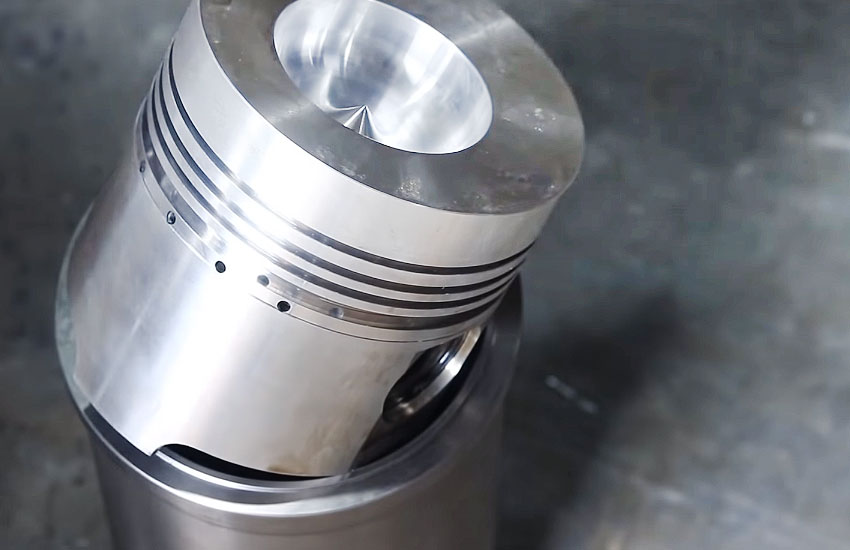The symptoms of a failing piston in a car engine include misfiring, loss of power, and excessive oil consumption. These signs may indicate a possible piston failure, requiring immediate attention.
When it comes to the crucial components of a car engine, the piston plays a vital role in the combustion process. A failing piston can result in various symptoms that can negatively impact the performance and efficiency of the engine.
Being aware of these signs can help diagnose and address the issue promptly, preventing further damage and costly repairs. Understanding the symptoms of a failing piston is essential for maintaining the health and longevity of your car’s engine. We will explore the common indications of a failing piston and the potential implications for your vehicle’s overall performance.

Loud Knocking Noise
When it comes to diagnosing engine problems, a loud knocking noise is often a clear indication that something is wrong. This particular symptom should never be ignored, as it usually points to a failing piston in the car engine. Excessive vibration and metallic sounds are also key signals of a potential issue with the piston.
Excessive Vibration
One of the symptoms of a failing piston in a car engine is excessive vibration. This can be felt throughout the vehicle, particularly when accelerating or idling. The piston, which moves up and down within the cylinder, could be damaged or worn, causing it to slam against the cylinder wall. As a result, the engine may shake violently, creating an uncomfortable and unstable driving experience.
Metallic Sound
Another telltale sign of a failing piston is a metallic sound coming from the engine. This noise is often described as a sharp knocking or tapping sound. It occurs when the piston starts to wear or develop a loose fit within the cylinder. As the piston moves, it may strike the cylinder wall, producing the distinct metallic noise. If left unaddressed, this issue can lead to further damage to the engine components.
Loss Of Power
One symptom of a failing piston in a car engine is a loss of power. This can result in reduced acceleration and overall performance.
Slow Acceleration
One of the key symptoms of a failing piston in a car engine is slow acceleration. When your car has a faulty piston, you may notice that it takes longer than usual for your vehicle to pick up speed. This means that when you press down on the accelerator, it will take longer for your car to respond and reach the desired speed.
Difficulty In Maintaining Speed
Another sign of a failing piston is the difficulty in maintaining a consistent speed. If you find that your car is struggling to keep up with the speed you have set, or if it constantly fluctuates, it could be due to a failing piston. This symptom can be especially noticeable when driving on highways or attempting to drive up inclines.
Poor Fuel Efficiency
A failing piston in a car engine can manifest in various symptoms, one of the most noticeable being poor fuel efficiency. It is crucial to recognize and address this issue early to prevent further damage to the engine and ensure optimal performance of the vehicle.
Increased Fuel Consumption
One of the primary symptoms of a failing piston is increased fuel consumption. As the piston’s functionality declines, the engine’s combustion process becomes less efficient, leading to a higher demand for fuel to maintain the vehicle’s performance. This increased fuel consumption can result in frequent trips to the gas station and a noticeable decrease in overall mileage, affecting the car’s operating costs and performance.
Black Smoke From Exhaust
Another noticeable indication of a failing piston is the presence of black smoke from the exhaust. This is caused by the incomplete burning of fuel due to irregular piston movement, leading to the emission of unburnt fuel particles as black smoke. This symptom not only signifies compromised fuel efficiency but also indicates potential damage to the engine’s internal components, necessitating immediate attention to prevent further complications.
Engine Misfires
When a piston in a car engine fails, one of the prominent symptoms is engine misfires. The engine misfires during combustion, causing a lack of power and rough running. Below, we’ll discuss various signs of a failing piston, with a focus on engine misfires and the related symptoms.
Rough Idling
Rough idling is a common sign of a failing piston. When a piston is not functioning correctly, the engine may struggle to maintain a stable and consistent idle. This can result in the vehicle shaking or vibrating while at a standstill, and the engine may produce irregular or uneven sounds while idling.
Engine Stalling
Another indication of a failing piston is engine stalling. During operation, if the piston’s performance is compromised, it can lead to the engine stalling unexpectedly. This occurs when the piston’s movement becomes irregular, causing the engine to lose power and eventually cease running altogether.
Conclusion
To summarize, recognizing the symptoms of a failing piston in a car engine is crucial for maintaining vehicle performance and preventing further damage. From misfires and decreased power to excessive oil consumption and strange noises, understanding these signs can save you from costly repairs down the road.
If you notice any of these indicators, it’s best to consult a mechanic for a thorough diagnosis and timely repairs. Keep an eye on your engine’s health and address any concerns promptly to ensure a smooth and reliable driving experience.


